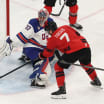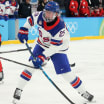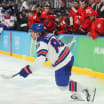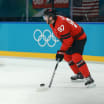Jarry reaching potential for Penguins following AHL demotion
Goalie improved practice habits after being sent down last season
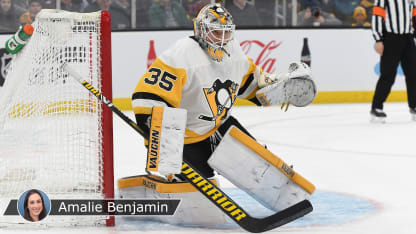
The Pittsburgh Penguins had all the faith in the world in Tristan Jarry, in the talent and skills that the goalie prospect had demonstrated since he was a 9-year-old hopeful at Angelo Maggio's goalie school in British Columbia. But there was something amiss.
That was why, after a 6-3 loss at the Colorado Avalanche on Nov. 28, 2018, when Jarry allowed five goals on 25 shots, the Penguins coach sat down with the goalie, hoping to communicate something crucial.
"Mike, in a very positive way, said that we know what your potential is," Penguins goaltending coach Mike Buckley recalled. "[But] time waits for no one. This is your time to really get it together. We know you can do it, so do it. That was the message. Pretty simple."
Jarry, who had joined the Penguins on Nov. 22, didn't play again after the loss to the Avalanche and was sent back to Wilkes-Barre/Scranton of the American Hockey League on Dec. 12. He would not return to the NHL that season, with Casey DeSmith the Penguins backup.
"It was tough," Jarry said last week at the 2020 Honda NHL All-Star Game, where he was an injury replacement on the Metropolitan Division team for Columbus Blue Jackets goalie Joonas Korpisalo.
"You obviously never want to get sent down," Jarry said. "And it was something where you're in the NHL, you always want to do your best. And I didn't think I had the greatest game, so it was something when I did get sent down, I wanted to improve. I wanted to come back better and stronger and make sure that the next time I had an opportunity I was making the most of it."
PIT@ARI: Jarry kicks out pad to rob Dvorak
He has done exactly that, flipping the story this season. Though a spot as the backup to Murray was not assured heading into training camp, the 24-year-old managed to beat out DeSmith for the job -- and more.
Since Dec. 1, Jarry has started 16 games for Pittsburgh, Murray seven. Prior to that, Murray had started 20 games this season to Jarry's seven.
Jarry is 16-8-1 this season with a 2.16 goals-against average and a .929 save percentage in 23 starts for the Penguins, who return from their NHL-mandated five-day break to host the Philadelphia Flyers at PPG Paints Arena on Friday (7 p.m. ET; ESPN+, SN, ATTSN-PT, NBCSP, NHL.TV). It's a reversal of roles for Murray, who took the No. 1 job from previous starter Marc-Andre Fleury, helping the Penguins win the Stanley Cup in 2016 and 2017, which led to Pittsburgh making Fleury available to the Vegas Golden Knights in the 2017 NHL Expansion Draft.
After Fleury's departure, Jarry got his first chance in the NHL, with 23 starts in 2017-18 as Murray's backup. But then came the game in Colorado, his second start in 2018-19, and the knowledge that what he had done to that point hadn't been enough to stick around.
The Penguins needed more. They have gotten it.
"We've seen his maturity both on the ice and off the ice [improve] the last couple of years," Sullivan said. "I think all the guys involved have done a great job, but Tristan himself, you have to give him a lot of credit. He's the guy that puts the work in; he's the guy that goes on the ice and gets the job done. He's done a terrific job with his preparation. He's done it from Day One of training camp, and I think his work ethic has translated into consistency of play."
But it was a process to get there, helped along by that conversation after the game in Colorado, what Buckley called a lightbulb moment.
It was mainly his practice habits, Buckley said.
"It's something that we really have harped on him a lot over the last seven years," Buckley said. "He used to get pretty casual in practice. Where he wouldn't always find the value of being on the ice and finding ways to get better and push himself. Sort of take the path of least resistance.
"And he had some really good years in Wilkes-Barre. Don't get me wrong -- the ability was there, the talent was there, the inconsistency was there, and that inconsistency stemmed from a lack of consistency in practice."
That needed to change. And there was only so much the coaching staff could do.
"To be honest with you, it had to be his choice," Buckley said. "We can only say it to him so much. And he heard it from me a ton. I think I have such a good relationship with him that when I'm on the ice with him I really don't have to push his buttons, he does that on his own.
"But it's the time when I would be away from him; for example, when he would be in the American League. He would kind of take his foot off the gas. With age, he's accepted that on his own and he doesn't even need that push anymore. He's finally gotten over that hump."
FLA@PIT: Jarry makes sprawling save on Ekblad
\\\\
This was what they hoped for from Jarry, who was selected by the Penguins in the second round (No. 44) of the 2013 NHL Draft after playing with Edmonton of the Western Hockey League. He had shown promise early, taking goalie lessons at age 7.
"At 9 years old -- I had trained him a lot -- I went up to Dave Jarry and just said, 'Dave, Tristan's special,'" Maggio said of Tristan's father. "There's something about him that I see that is going to one day become something. That's all I said to him. And he said, 'What do you mean?'
"He had great reads, shots off the blade, and great kinesthetic awareness. I just started seeing something that I haven't seen with others at that age."
Maggio encouraged that, helped tease out the talent, without forcing him into a particular style. They skated endlessly, worked on playing the puck, making Jarry comfortable not with what he wasn't, but with what he was.
"You could see he had an original way of playing," Buckley said. "Kind of an authentic playing style to himself. He wasn't a cookie-cutter goalie that did everything from a tactical standpoint, like a goalie-school goalie. He read the play differently. He handled the puck. A lot of similarities to (Hall of Fame goalie) Martin Brodeur in terms of just the way he read the game and went about it."
Jarry has been exactly what the Penguins have needed this season, a calm, cool goalie who doesn't often get rattled, a player his former WHL coach Derek Laxdal, an assistant with the Dallas Stars, called "the silent assassin."
Pittsburgh has dealt with plenty of injuries this season, to forwards Sidney Crosby, Evgeni Malkin and Jake Guentzel, defensemen Kris Letang and Brian Dumoulin, and more. Coupled with the struggles of Murray, who is 15-6-4 with a 2.84 goals-against average and .900 save percentage, it could have made for a difficult season.
Instead, the Penguins (31-14-5) have the fourth-highest point total in the NHL (67) and sit second in the Metropolitan Division, six points behind the NHL-leading Washington Capitals.
That is largely because of Jarry's emergence. And that all comes back to that conversation with Sullivan, to Jarry's rededication to his progression and his practice, to his embrace of the ways in which he needed to be better, to take advantage of his copious talents.
PIT@CGY: Jarry stymies Lucic on the break
\\\\
Back in November 2018, when the conversation occurred, Jarry was impatient. He wanted to be in the NHL, felt he was ready. And yet, there he was, back in the AHL.
So he made the most of it.
"Every year they wanted me to work on my practice habits and they got a little better each year, and I think the last year, just working with Andy, I really was able to key in on them and make sure that my practice habits were where they needed to be," Jarry said of Andy Chiodo, the Penguins goaltending development coach.
It was noticed.
"I would use the word unrelenting," Chiodo said. "The entire season he earned a great deal of respect from his teammates, from our coaching staff, from management, for how he practiced every single day. I'd give Tristan every out to take that skate [off] if he wanted it, and he just wanted more."
Jarry would go onto the ice 30 minutes early, would do drills with assistant J.D. Forrest when Chiodo was out of town. He would prepare in ways he hadn't, something that has been reinforced this season when he has watched the habits of Murray.
"I think just a little bit of everything, making sure that I was able to focus and keep my focus throughout the whole practice, and then making sure that I was keeping that same level of compete for the whole practice," Jarry said. "That might have been something where I lacked before -- I might only be able to focus for 30 minutes and compete for 30 minutes, where the practice went 40."
He pushed his mind. He pushed his body.
He figured out what Buckley and Sullivan had been telling him for all those years, what they needed of him to take the next step.
At long last, Jarry has taken that step. He has become the goalie that they knew he could be, that he knew he could be.
"If you're on the cusp of becoming an NHL goaltender and you have the ability to be an NHL goaltender, an NHL No. 1, to be a champion and you're not, you're missing a piece," Chiodo said. "And that, to me, comes from self-awareness. That, to me, comes from learning about yourself. That comes to really diving into the weaknesses of your game, going to those uncomfortable places and looking those things in the face and finally turning the corner. And when goaltenders do that, and they have the ability to play, that's when it all comes together."




